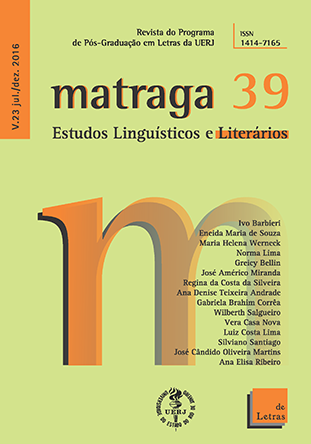Dirce – pedagogia e poética
DOI:
https://doi.org/10.12957/matraga.2016.26024Palavras-chave:
Literatura, educação, crítica.Resumo
Este artigo tenta mostrar afinidades entre a atividade docente e o discurso crítico elaborado por Dirce. O projeto de ação pedagógica repercutia na sua concepção da invenção poética. Nas aulas como em seus escritos, em vez de respostas acabadas, ela propunha indagações que incitassem à reflexão e abrissem outras possibilidades de leitura, bem de acordo com a didática montessoriana que preconizava o estímulo à autoaprendizagem. O mote que permeia esta explanação parte da ideia de que o artista, como a criança, em seu impulso lúdico, inventa mundos novos. A invenção infantil pressupõe curiosidade espontânea da criança quando desembaraçada da submissão ao poder da casa e da escola. Dirce explora essa temática na ficção brasileira dos séculos XIX e XX, através das narrativas de O Ateneu, Infância, Menino de engenho e, especialmente, da novelística de Guimarães Rosa. Naqueles, a pesquisadora analisa o poder impositivo que imobiliza crianças e adolescentes, inibindo-lhes o imaginário e o prazer de encantamento propiciado pelo lazer criativo exercitado fora da escola. A crítica-educadora não deixa de anotar a denúncia dos narradores fictícios contra as arbitrariedades praticadas pela escola. Particularmente, na obra de Guimarães Rosa, o mundo maravilhoso da criança consegue se sobrepor ao desencanto imposto pelos adultos. Pirlimpsiquice das Primeiras estórias é exemplo emblemático dessa contraposição. De um lado, um mestre impondo verdades incontestáveis; do outro, as verdades inventadas no jogo da representação. Neste espaço textual, cruzam-se vários textos que se fazem e desfazem recuperando o mundo “milmaravilhoso”, ludicamente inventado. O ensino da literatura gira em órbita similar à do jogo, irmanando elaboração poética e comunicação didático-pedagógica – conúbio celebrado pela professora Dirce.
---
DOI: http://dx.doi.org/10.12957/matraga.2016.26024
Downloads
Downloads
Publicado
Como Citar
Edição
Seção
Licença
AUTORIZAÇÃO
A Matraga – Revista do Programa de Pós-Graduação em Letras da UERJ está autorizada a publicar o artigo ora submetido, caso seja aceito para publicação online. Fica atestado que a contribuição é original, que não está sendo submetida a outro editor para publicação, e que a presente declaração é a expressão da verdade.
Os trabalhos publicados no espaço virtual da Matraga – Revista do Programa de Pós-Graduação em Letras da UERJ serão automaticamente cedidos, ficando os seus direitos autorais reservados à Matraga. Sua reprodução, total ou parcial, é condicionada à citação dos autores e dos dados da publicação.

A Matraga utiliza uma Licença Creative Commons - Atribuição-NãoComercial 4.0 Internacional.





